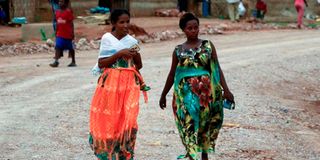Ethiopia now targets Tigrayans living in Addis, says HRW

Ethiopian refugees who fled the fighting in Tigray. Human Rights Watch has raised the alarm over the alleged conduct of Ethiopian authorities against Tigrayans living in Addis Ababa.
Human Rights Watch (HRW) has raised the alarm over the alleged conduct of Ethiopian authorities against Tigrayans living in Addis Ababa.
The lobby has released a report saying Tigrayans are arbitrarily detained, forcibly disappeared, and subjected to other forms of abuse by Prime Minister Abiy Ahmed’s government.
In the report issued on Wednesday, HRW said that since Tigray’s regional capital Mekelle was recaptured on June 28 by the Tigray People’s Liberation Front (TPLF), government security forces have escalated human rights violations against ethnic Tigrayans in Addis Ababa.
“Ethiopian security forces in recent weeks have carried out rampant arbitrary arrests and enforced disappearances of Tigrayans in Addis Ababa,” said Laetitia Bader, HRW’s Horn of Africa director.
The lobby has demanded that authorities immediately account for Tigrayans forcibly disappeared and release those being held without credible evidence of crime. It has also called on Ethiopian authorities to end all discriminatory treatment.
Arbitrary arrests
HRW has also urged authorities to end arbitrary arrests and detentions of Tigrayan activists and journalists.
“The government should immediately stop its ethnic profiling, which has cast unjustified suspicion on Tigrayans, produce information on everyone being held, and provide redress to victims.”
HRW issued the report after several interviews with current and former Tigrayan detainees, business owners, relatives of detainees, witnesses to abuses and lawyers.
It says it also reviewed court and police documents and relevant photos.
In mid-July, Addis Ababa police commissioner Getu Argaw told the media that over 300 Tigrayans had been arrested. He said they were under investigation for their alleged support for TPLF, which Ethiopia’s parliament designated as a terrorist entity in May along with the Oromo Liberation Army (OLA), referred to by the government as OLF-Shene.
Ordinary citizens targeted
Although the attorney-general told the media that ordinary citizens would not be affected, according to HRW’s research, most, if not all, appeared to have been targeted on the basis of their ethnicity.
Witnesses and former detainees told HRW that police checked identity documents before arresting people and taking them to detention centres.
They said security forces stopped and arrested Tigrayans on the streets, in cafés and other public places, in their homes and in workplaces, often during warrantless searches.
“In many cases, security forces checked people’s identification cards to confirm their identity before taking them to a police station or other detention facility,” the report says.
“A Tigrayan political activist and a Tigrayan aid worker, both based in Addis Ababa, were among those arrested in July, as were at least a dozen journalists and media workers who have reported on abuses against Tigrayans.”
Businesses closed
Since late June, security forces and police have also closed dozens of businesses owned by Tigrayans in several neighbourhoods of Addis Ababa.
“Many of the unlawful tactics currently being used by the security forces, such as secretly transferring suspects among various police authorities to evade legal requirements and prolong detention periods, were used in 2020 against arbitrarily detained opposition figures and journalists,” HRW says.
While family members often knew where their relatives were being held during the first few days of detention, many were then secretly transferred to unidentified locations.
Forcible disappearance
“Lawyers and families discovered, often weeks later and sometimes only informally, that some detainees were being held in the Afar region, over 200 kilometres from Addis Ababa. The whereabouts of others, including 23 cases Human Rights Watch documented, remain unknown,” the report says.
“Forcibly disappearing people denies them access to lawyers, undermining their right to a fair trial, and may inflict severe mental suffering on their families.”
Last month, victims of the ongoing wave of arbitrary arrests told Nation.Africa that they were targeted on the basis of their ethnicity. They said they lived in fear of getting arrested again despite their release.
Previously, Addis Ababa and federal police denied allegations of large-scale ethnically motivated crackdowns.





